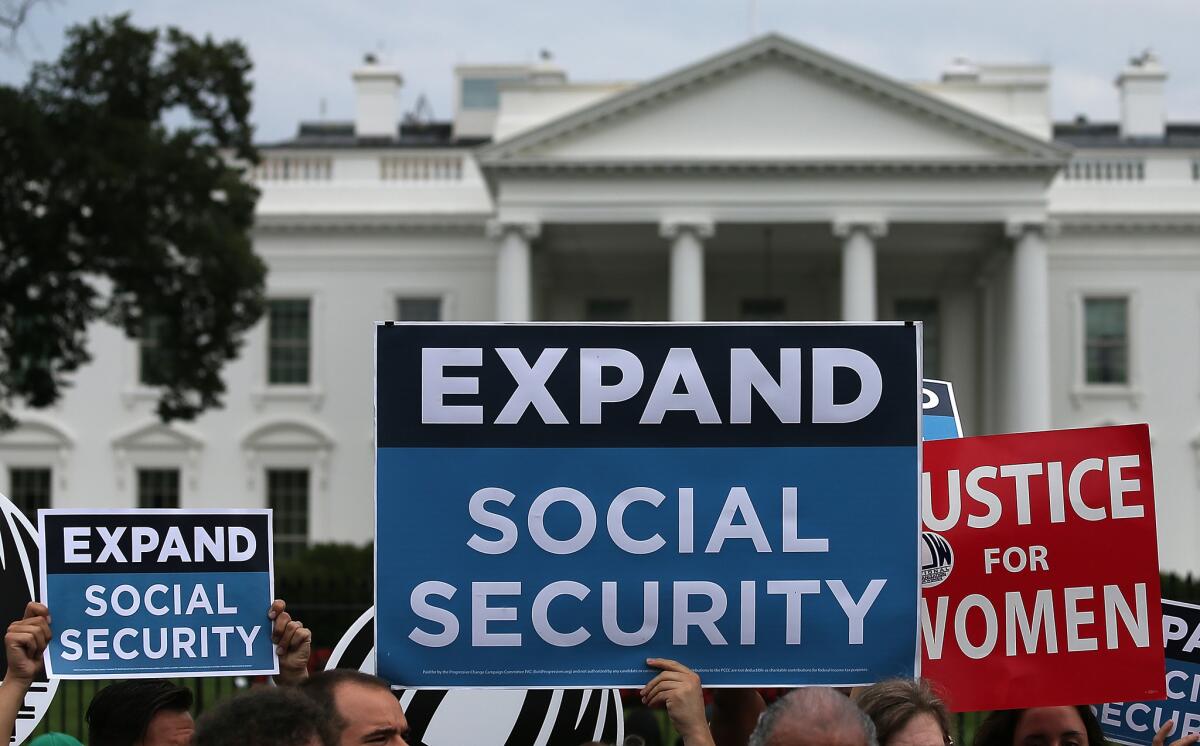Disability benefits for 11 million people at risk as Congress in stalemate

Activists participate in a rally in front of the White House last week, urging the expansion of Social Security benefits.
Nearly 11 million Americans who receive federal disability benefits risk seeing their checks reduced unless Congress acts by next year to replenish the system’s trust fund, the Social Security trustees reported Wednesday.
The pending cash crunch in the disability fund is one of those slow-motion -- and largely self-created -- crises that Congress usually fails to resolve until a deadline hits. The latest report puts that deadline, the date when the disability trust fund will reach insolvency, in fall of 2016.
After that point, tax revenues will cover only about 80% of scheduled disability benefits, unless Congress acts to fix the system.
The trustees also forecast that the main Social Security retirement fund will remain solvent until 2034, one year longer than previously reported. The Medicare trust fund will remain solvent until 2030, the trustees projected, the same date reported last year.
“Both Social Security and Medicare are secure today and will remain secure in the years to come,” Treasury Secretary Jack Lew said in announcing the latest forecasts.
One of the system’s public trustees, Robert D. Reischauer, the former director of the Congressional Budget Office, offered a less rosy assessment.
While Social Security and Medicare are stable for now, “these vitally important programs are on a fiscally unsustainable path if one looks out several decades,” he said, largely because of the huge number of baby boomers entering retirement.
The sooner Congress acts to fix the two programs’ long-term financial problems, the more options lawmakers will have, he added.
By contrast, Congress’ failure to deal with the problems of the disability insurance system “could offer a case study in the potential consequences” of kicking issues down the road and not resolving them, Reischauer said.
Over the next year, the millions of people who depend on benefits checks will be put through a lot of unnecessary anxiety as the deadline approaches, he said, adding that “beneficiaries deserve better.”
For all their urgency, the problems of the disability insurance system have long been predicted.
The number of disabled workers in the United States has doubled since 1995 due to several factors, including the aging of the baby boom generation, which means there are more workers in their 50s and 60s, the peak ages for disability. The rise in the Social Security retirement age has also led to more people working later in life.
The growth in the number of disability recipients has slowed in the last two years, largely because the economy has improved, but the number of people on the rolls already has grown beyond the system’s current financing.
Disability benefits are financed by a portion of the Social Security taxes that workers and their employers pay. Currently, 0.9% of earnings go to the disability fund and 5.3% go to the retirement fund.
Most Democratic lawmakers and advocates for disability recipients argue that Congress should solve the disability system’s problem by increasing the share of the tax that goes to the disability fund.
The Obama administration has proposed shifting an additional 0.9% of payroll to the disability trust fund. That would keep the disability system above water for a couple of decades -- buying time for other reforms.
Congress has shifted the allocation formula in both directions several times going back decades. This year, however, Republicans in Congress adopted a rule designed to prevent that shift from taking place. They argue that too many workers are receiving disability payments and that the system should be reworked as part of any solution to the disability system’s financial problems.
The system’s other public trustee, Charles P. Blahous, a former aide to President George W. Bush and a research fellow at the Hoover Institution at Stanford, suggested that option probably won’t work.
Because Congress has delayed action for so long, there is currently “no realistic reform” of the disability system that would fix its financial problems in time, he said. The only option is to give the system an “infusion of resources” through reallocating social security tax revenue.
“By the time the trust fund depletion date arrives, in some senses, it’s too late” for reforms, he said, suggesting that Congress should heed that lesson and start working seriously on fixing Social Security’s long-term problems.
For more on politics and policy, follow @DavidLauter on Twitter.
ALSO:
FBI treating Chattanooga shooter as ‘home-grown’ extremist who acted alone
Death penalty is sought against James Holmes, but governor stands in the way
Customs and Border Protection’s new internal affairs chief faces ‘very, very tough job’
More to Read
Start your day right
Sign up for Essential California for news, features and recommendations from the L.A. Times and beyond in your inbox six days a week.
You may occasionally receive promotional content from the Los Angeles Times.







